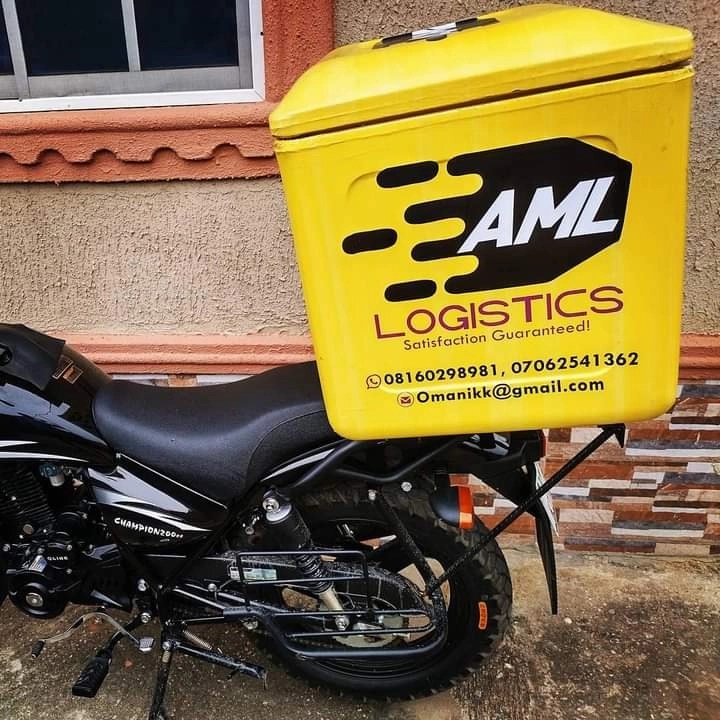
There are so many lucrative businesses in Nigeria now, one of those is the logistics business. With so many young people forced to delve into the business of E-commerce like; Selling hair, selling clothing, shoes, food vendors, bags and so many more because of the hard condition of the economy, the logistics business has become a major gold mine for people who have a good business plan and for people who are interested in making money through logistics.
One of the companies that have been given numerous names is logistics. Some refer to it as a delivery business, while others refer to it as a transportation firm. Despite this, they all imply the same thing. The logistics industry is concerned with transporting things from one location to another, from the maker to the end customer.
As previously said, because it’s complimentary since products purchased online must be delivered to the client. As a result, a logistics company is a sure-fire viable business concept. However, you should be aware that it is possible to lose your money if you lack the necessary skills to effectively establish this business in Nigeria. Every viable business has a downside if you are not prepared for it.
In this article, we would tell you how to own a logistics business; the cost implications, how to set it up and your expected monthly earnings (Ceteris paribus).
Let’s start with what the logistics business is all about.
What is The Logistics Business All About?
A logistics business is responsible for the planning, implementation, and management of the transportation and storage of products, services, or information along a supply chain and between places of origin and consumption. Logistics may be traced back to the military. During the first and the second World war, it was utilized to swiftly transport food, weapons, and other supplies.
People began to investigate logistics as a full-fledged industry after the war. Many firms have arisen and expanded throughout the years to become industry giants. Courier Plus Services Limited, Creseada International Limited, AML Logistics, AXPD Resources Ltd, GIG Logistics, AGS Movers Lagos, and Ocenj Logistics, are some of the logistics businesses in Nigeria you may research as you begin. Within the corporate sector, logistics may also refer to warehousing, shipping, packaging, inventory, material handling, security and disposal.
What does this tell you? Simple, there are other areas of logistics that have not been adequately tapped into or tapped into at all in Nigeria, for example; crime scene cleaning logistics, hazard environment cleaning logistics and so many more.
At this point. Let’s now look into the cost implication of starting/owning a logistics business.
How To Start A Logistics Business In Nigeria – Cost Implications
1. Get a Bike:
The logistics industry necessitates a significant investment in terms of equipment and people, due to the rising falling power of the Naira, the cost of starting a Logistics Business in Nigeria has increased dramatically. Initially you could start a logistics business with 900,000 naira, now the startup cost is different. To start up a logistics business in Nigeria, you need at least Seven hundred thousand naira (N900,000). This amount covers getting a brand new bike at the cost of N470,000 without a plastic carrier also known as Box for carrying items, all necessary papers for your bike excluding the NIPOST license, purchasing and fixing of the box, branding and other miscellaneous expenses. You may purchase a decently used bike for at least N250,000 or more if you can’t afford a new one, however, I would recommend you purchase a new one.
A box is needed for operation too as this would be attached to the iron extension at the back of the bike. Cost of a new GP brand new box cost 60,000 naira while fairly used goes for between twenty seven thousand naira (N27,000) to thirty thousand naira (N30,000.00). Please note that you will also incur some expenses in the process of attaching and welding the box to the back of the bike as well as fixing the sand protector, retightening of all nuts on the bike despite being new and covering of the fuel tank cover to prevent water from gaining access. All these would cost around 15,000 naira.
A bike is highly useful for logistics companies since it can easily maneuver around traffic (meander in and out of traffic) than a car. Run complete insurance on the bike to avoid issues in the event of an accident. This is for those who would like to start with a bike, with time you can get a van for delivery purposes. But if you stay in places like Lagos, Port Harcourt and Abia State with serious traffic, I would suggest you begin with a bike unless you decide to venture into haulage logistics.
Note: When purchasing your bikes, it is advised that you inquire about the exact bike that is recommended in the state in which your business is located. The reason for inquiring about a certain bike model is because of state laws (mostly states that have banned the use of bikes).
For Lagos state, Abuja, Port Harcourt, Benin, Onitsha, Kaduna and other major cities in Nigeria the specification of bike required for logistics business is 200CC bikes of any brand. Based on my experience in this business I will recommend you use a Qlink bike because of its durability and fuel efficiency.
Please don’t ignore it or dismiss it as unnecessary the above advice, because if you by chance break the state’s standard bike model, be certain that the police and local government will rip you off your profit.
2. Register Your Bike (License and Local Govt Paper):
This is the most important part you must fulfil before venturing into Logistics Business in Nigeria. Ensuring you have your complete papers would help you avoid being held by the various government regulatory agencies like the police, VIO, FRSC, NIPOST field officers as well as local government officials on the road. The following papers are required for your logistics business;
- All local government registration papers
- Hackney permit
- Okay Paper
- State Carriage Paper
- License Paper
- LASAA and OGSAA license (for those who wants to brand their boxes and reside in Lagos and Ogun)
- MOT
- Roadworthiness Paper
- Midyear Paper (3,000 Naira)
- UNIFIED Security Permit (10,000 Naira)
- Class A Driver’s License – 12,000 Naira (For your Rider) – Enforced by FRSC
- Riders Card – 5,000 Naira (For your Rider) – Enforced by Local Govt
You can reach me via the comment section if you are interested in getting all papers.
The cost implication for getting all papers done is around 100,000 naira excluding the NIPOST license which costs 250,000 naira for a maximum of 5 bikes and 2million for 5 bikes and above and subsequent payment of 100,000 naira yearly.
3. Register Your Business Name:
This is another thing that may cost you a token, with N10,000 – N20,000, you should be able to register a good business name for a start but if you want to make it a limited liability company it will cost around 60,000 or more. It is just as vital to have a business name as it is to have business cash. Giving your firm a name establishes its legitimacy in the eyes of the public. Nobody wants to do business with a firm that doesn’t have a name. They would prefer to do business with a fake firm that has a name than with a legitimate business that does not have a name.
And when it comes to naming your Logistics firm, make it something that the general public can readily connect to, such as; Cargo to Nigeria, AML logistics, Zoom logistics and so on.
However, if you are having difficulty coming up with a name that is relatable, you may select a name that is easy to remember or one you can connect everyday life activity to. Just ensure it isn’t a complicated or bogus word(s). Having a registered business is very important thing.
4. Mobile Phone:
Of course, a cell phone is required, not just for you but also for your riders. How can people contact you if they want to place an order, or how can you contact your riders if you need to, and vice versa?
As a result, the essence of a mobile phone cannot be substituted since it is critical to the success of this firm. In the beginning, you may even use your cell phone to track if you cannot afford a computer. A decent Android or iOS phone will give you the advantage, to begin with. Make sure that the phone your riders would be using would have a good battery life, With N40,000 or less, you can get a good phone that is efficient. However, you could skip this part by simply buying a sim card for your rider which will be collected anytime he’s leaving.
5. Stationeries:
This includes elements that help the logistics service function smoothly. Biros, books, tables, seats, cartons/store boxes, rulers, and other items fall under this category. You may find it challenging to manage your business efficiently if you lack these essentials. You can get all of these stationeries with as little as N10,000.
6. Rider’s Salary:
This depends on your financial muscle, however, they need to be paid according to their status. In the industry, an experienced rider collects from 60,000 to 100,000 and above pending on the capacity of the company. A newbie collects between 40,000 and 50,000 monthly.
7. Social Media:
Use social media to attract additional eCommerce businesses and online merchants. Use social media platforms such as Facebook, Instagram, Twitter, and your website to spread the word about your logistics company. People seeking your services will be able to simply discover you. You can do all these without spending any money, all you need is to have data on your phone and you are good to go.
8. Desk Computer/Laptop:
If you can’t obtain a computer, please get a mobile phone (make sure it’s a decent mobile phone),” I remarked about the phone. The major function of having computers is to maintain records, which can be replaced with a book (if you can’t afford a computer).
Because of their ability to execute several jobs without slowing down or shutting other applications, computers make it simple to track your bikes in real-time. Of course, you may also take orders if you have a website where people can make orders or if you register on other social media platforms that connect you with possible clients. You can use your phone, your laptop if you have one or you can purchase a fairly used one for as low as N50,000 or less.
9. Rent An Office Space:
The logistics industry is both online and offline. Some clients would rather come to your office to send their packages. As a result, you’ll need to find an office location where you can also park your cars and bikes. The office space is something that may simply be substituted.
However, if you are conscious that your capital is insufficient, you may make your house your office space for the time being, and as time passes (along with an increase in money and client base), you can brand your office and cars to generate awareness and attract your target market.
But, as a starting point, if you can’t find a low-cost, safe office space, I propose working from home is okay in Nigeria.
10. Open a Website:
Though this is secondary for a modest startup, bear in mind that a website is required for a logistics company. Your website will act as a go-between for you and your consumers. If someone wants to learn more about your company, they can go to your website, acquire the information they need, and contact you straight from there. WordPress or WooCommerce are simple systems that can assist you in creating a low-cost website.
Also, you can open a simple business website through google for free (Google my business or googlemybusiness.com). You can also enter details about your business; the time you open, the name of your business and other information they may require from you.
11. Business Strategy:
Starting a business of this level without a business strategy is like driving without a purpose or direction. Some may argue that if you know what you’re doing, you don’t need a business strategy. Except you want to go loan sharking, even that needs a business plan because you simply can’t know what you’re doing if you have no idea where you’re going?
A business plan is more than just telling the loan officer why you should receive it. It provides you with the company’s prediction and also prepares you for key periods that might either boost or deflate your firm. It helps to be informed ahead of time in any case.
It also aids in the maintenance of a healthy financial flow. The benefits of having a strategic plan before beginning a firm are far more than you may believe. And if you’re still not persuaded that you need one, I recommend doing some research on “why you should acquire a business plan.” I tell you that you cannot start this business without a business strategy.
It costs nothing to draft a business plan/strategy, all you need to do is, sit down and pen down your ideas about your logistics business as well as how you plan you achieve your goal and you’re your business a successful one.
Below are some of what must be included in your business plan;
- A summary of your logistics company
- A brief overview
- General company information
- The SWOT analysis
- Market Analysis
- Your Approach
- The Group
- A marketing strategy
- An operational strategy
- Financial forecasting
With this, you are ready to start your logistics business.
So, in summary, the speculative cost for starting a logistics business is:
- Bike = N470,000 for a new bike (200 CC)
- Box (New/fairly used) = 60,000/30,000 respectively
- Branding of Box plus logo (Optional) = 12,000 and above.
- Registration of business name =N20,000
- Mobile phone = N50,000
- Stationeries = N10,000
- Laptop = N75,000 (Assuming you don’t have one and you can’t use your phone)
- Complete Motorbike license plus local government papers = 100,000
- Monthly Salary = 60,000
Just as stated earlier in this article, with N700,000 one should be able to start up a logistics business in Nigeria irrespective of your state of residence..
Next, we would answer the question of how profitable the logistics market is below.
Is the Logistics Industry Profitable? Expected Monthly Profit
The first concern of everyone establishing a business is whether or not the firm will be successful. A logistics company’s profitability is defined by how many clients it can recruit in a certain period, its pricing strategy, and its delivery efficiency. When you have a good plan for market penetration and client retention, you may make a lot of money in the business.
As long as the e-commerce industry advances, the logistics industry will remain important and profitable. In the logistics sector, if you understand the business, you can collect millions of dollars. For example, suppose you have 20 customers that use your service and each one sends out 100 things every month. It implies you’ll have made 2,000 deliveries by the end of the month. In other words, you must create an effective method for obtaining recurring clients.
Most logistics companies charge around N1,500 to 5,000 for each delivery, it depends on the location and weight of the item. So, assuming as a startup you deliver 20 items in a week you can make 40,000 Naira after deducting fuel and recharge card for the rider. Realistically, in a month you can make between 180,000 to 200,000 as a start up in this business. Remember your income is bound to increase monthly as your clientele base increases too. Don’t be deceived by the bogus figures you see on some online platforms, I run this business so I can confidently tell you what it entails.
According to Dr Obiora Madu, Director-General of the African Centre for Supply Chain, the value of the logistics sub-sector of the economy presently stands at N250 billion, according to the 2018 Logistics and Supply Chain Industry report. This sheds light on how profitable the industry is.
In summary, the expected monthly earnings for anybody or company planning to go into the logistics business is highly dependent on how well you market your company and the number of regular customers you’re able to maintain.
I will keep updating this post as new developments are revealed.




